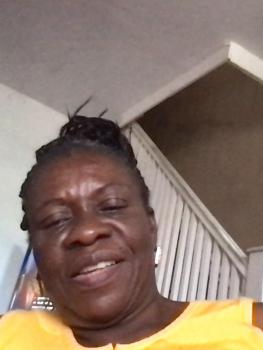Asamoah ’21M Establishes Organization to Support Girls in Ghana

During a trip home to Kumasi, Ghana in 2018, International Peace and Conflict Resolution (IPCR) alumna Comfort Asamoah ’21M was appalled by the treatment of young girls who work in the markets.
Asamoah observed and heard stories of girls as young as 8 years old being transported from impoverished communities in northern Ghana to work as maids or porters for families in Kumasi, the capital of the Ashanti region of Ghana. Many of the girls, known as kayayei, sleep on the streets of the market and are survivors of rape.
If survivors get pregnant from this crime, they don’t have money to access doctors or hospitals for care or even delivery. When the girls are able to access a hospital to deliver their babies, the outcomes are bleak as well. If fees aren’t paid upfront, doctors sometimes refuse to help and the baby dies or both the mother and child dies. If they can’t pay for their care before leaving the hospital, they will sometimes be held there against their will. Other times, their babies will be stolen through illegal adoptions.
“Who will be there to fight for them?” said Asamoah, who moved to Philadelphia from Ghana in 2004. “There’s no protection for them. When I was meeting with these girls at the hospital, I felt that something must be done to help.”
Asamoah’s organization, Obour Arms, launched in 2020 and is focused on helping these girls get the help and medical attention they need. The translation of Obour Arms, Asamoah said, means strong arms or rock arms—a representation of the support the organization provides to kayayei.
Although COVID has made it difficult for Asamoah and her co-founders to travel to Ghana to do the groundwork documentation and mapping, she’s hopeful that the group will be able to go in September. Until then, they’re making arrangements to meet with the leadership of the Ashanti region to formally address concerns about the treatment of kayayei.
One day, Asamoah hopes that Obour Arms will provide assistance to kayayei for prenatal care and postnatal care, as well as support for mother and child after they leave the hospital. Additionally, she hopes that pressures from the international community will force leadership to address the crimes against kayayei.
“Through the study abroad to Cyprus in the IPCR program, we were able to do mapping and examine the different ways of how people live,” said Asamoah. “This impacted me very much because it showed me how you go about it so you have documentation about the population, how they live, where they sleep, and what they do. Then, you can state your case to NGOs and possibly the United Nations about what’s happening.”
Asamoah is no stranger to demanding changes in her home country. In the 1990s, she engaged in sustainability activism after farmers outside of Kumasi were unknowingly poisoning the region’s water supply with agricultural pesticides and chemicals. She worked with groups throughout the region to host an awareness marathon throughout the city. Through this awareness campaign, they were able to educate the community and develop solutions that helped farmers sustain their livelihoods while keeping the soil and water supply clean and safe for consumption. Additionally, in 2000, she ran for parliament as the only female candidate—placing third in the elections.
“It created awareness for women that they can do anything,” said Asamoah, who noted that up until that time culturally women were expected to have the men bring their issues forward. “It was beautiful. Now, we have members of Parliament who are women, and women in general are taking part in government activities. So, if we did that, we can do this.”

